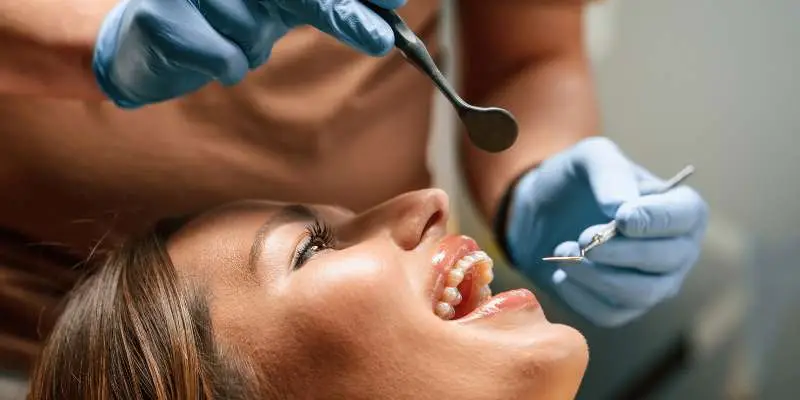Experiencing bleeding gums can be both alarming and discomforting. It’s a common issue that many individuals face, yet often overlook, dismissing it as a minor inconvenience.
However, bleeding gums can be a sign of underlying dental problems that, if not addressed, could lead to more serious health complications. Fortunately, there are effective measures you can take to alleviate this condition and improve your oral health.
Understanding Bleeding Gums
Bleeding gums are frequently a symptom of gum disease, also known as gingivitis in its early stages, and periodontitis when it becomes more advanced. Recognising the signs early on can be crucial in preventing the progression of the disease and maintaining a healthy mouth.
The Causes of Bleeding Gums
Several factors can contribute to bleeding gums, ranging from poor dental hygiene to more serious health conditions. The most common cause is the buildup of plaque at the gum line, resulting from inadequate brushing and flossing. This plaque harbours bacteria that can irritate and damage gum tissue, leading to bleeding. Other contributing factors include smoking, hormonal changes, especially in women, certain medications, and underlying health conditions such as diabetes.
Why It’s Important to Address
Ignoring bleeding gums can lead to periodontitis, a more severe form of gum disease that can damage the soft tissue and bone supporting your teeth, possibly leading to tooth loss. Moreover, research has linked gum disease to other health issues, including heart disease, diabetes, and stroke, highlighting the importance of maintaining good oral health not just for your mouth, but for your overall well-being.
Effective Solutions for Bleeding Gums
Addressing bleeding gums doesn’t have to be complicated. With the right approach, you can significantly reduce inflammation and improve your oral health. Here are three effective strategies:
1. Improve Your Oral Hygiene Routine
Enhancing your daily oral care is the first step towards stopping your gums from bleeding. This includes brushing your teeth at least twice a day with fluoride toothpaste, flossing daily to remove plaque from areas your toothbrush can’t reach, and using an antiseptic mouthwash to kill bacteria and reduce inflammation.
I recall a patient, Sarah, who struggled with bleeding gums for months. By simply improving her oral hygiene routine, focusing on thorough brushing and regular flossing, she saw a significant reduction in bleeding within weeks. Sarah’s experience underscores the effectiveness of diligent oral care.
2. Visit Your Dentist Regularly
Regular dental check-ups and cleanings are vital in preventing gum disease and, consequently, bleeding gums. Your dentist can remove plaque and tartar that brushing and flossing at home can’t, and identify and treat gingivitis before it progresses. It’s recommended to see your dentist at least twice a year for a professional cleaning and examination.
3. Make Lifestyle Changes
Lifestyle factors, such as smoking and a poor diet, can exacerbate gum disease and bleeding. Quitting smoking can significantly reduce your risk of developing gum problems. Additionally, eating a balanced diet rich in vitamins and minerals, particularly vitamin C and calcium, can strengthen your gums and overall oral health.
When to See a Dentist
If you’re experiencing persistent bleeding gums despite improving your oral hygiene and making lifestyle changes, it’s crucial to consult your dentist. They can assess your condition, provide a professional cleaning, and recommend further treatment if necessary.
Diagnosis and Treatment
Your dentist will examine your mouth to determine the cause of your bleeding gums and may perform additional tests to check for signs of periodontitis. Treatment options vary depending on the severity of the condition but may include professional cleaning, scaling and root planing (a deep cleaning method), and, in severe cases, surgery.
Prevention is Key
Ultimately, the best way to combat bleeding gums is to prevent it from occurring in the first place. This means maintaining a rigorous oral hygiene routine, visiting your dentist regularly for check-ups and cleanings, and leading a healthy lifestyle.
Bleeding gums can be a sign that your oral health needs attention. By understanding the causes and implementing the solutions outlined above, you can take control of your gum health and prevent further complications. Remember, taking care of your gums is an investment in your overall health.
Don’t let bleeding gums disrupt your life any longer. At Danbury Dental Care, we’re committed to helping you achieve optimal oral health. Book an appointment now for an initial consultation where our expert team will provide X-rays, create a personalized treatment plan, and assist you in prioritizing the necessary dental care. Take the first step towards a healthier smile and Book An Appointment today!








